50th Memorial of the start of the Lebanese Civil War
Hkeeli at Beit Beirut: A Space for Memory and Dialogue

On Sunday, April 13, 2025, exactly fifty years after the outbreak of the Lebanese Civil War, Beit Beirut opened its doors to host the inauguration of Hkeeli, a bold and deeply symbolic initiative dedicated to fostering a public conversation on memory, identity, and healing in Lebanon.
Organized by Allo Beirut, the Forum for Memory and Future, the Lebanese Association for History, the Arab Institute for Women at LAU, the Neighborhood Initiative at AUB, and the Municipality of Beirut, and made possible with the support of UN Women and the Friedrich Naumann Foundation for Freedom, Hkeeli transformed the war-scarred building of Beit Beirut into a space where stories, voices, and collective reflection could meet.
Far from being a commemorative exhibition marking the fiftieth anniversary of the war as a closed chapter, Hkeeli positioned itself as an open and ongoing invitation, a threshold into difficult conversations that remain as urgent today as they were in 1975.
The initiative set out to reclaim public space for memory, not as nostalgia nor as a distant past, but as a living presence that continues to shape Lebanese daily life, politics, relationships, and identities.
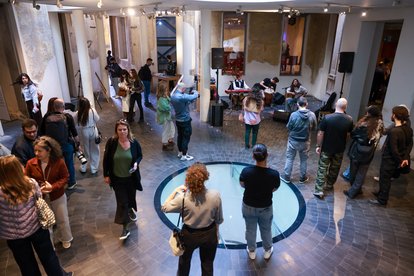
A City Walk Along the Former Green Line
The day began with a walking tour led by storyteller Samira Ezzo, tracing Beirut’s former Green Line that once divided the city during the war. This urban journey not only revisited history but also invited participants to reimagine the city as a space of connection rather than separation.
The tour moved from the National Museum to Beit Beirut, highlighting hidden stories, murals, and personal memories embedded within the city’s architecture.
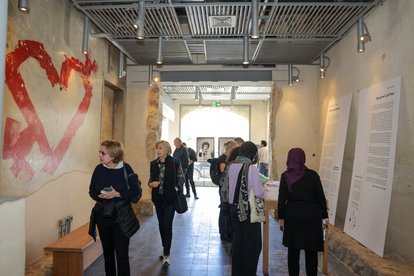
Memory as a Game: Echoes of the Green Line
In the afternoon, participants engaged in “Echoes of the Green Line”, an interactive game developed by Tripulley. Designed as a rally paper across Beit Beirut and its surroundings, the game challenged teams to uncover fragments of Beirut’s divided past through clues and encounters, turning memory into a participatory and collective exercise of discovery.
The Human Library: Stories Face to Face
Inside Beit Beirut, the Human Library offered powerful one-on-one encounters with women activists, artists, former fighters, and individuals who carry Lebanon’s memory within their personal stories. Moving beyond formal presentations, these living books shared their experiences directly with visitors, blurring the line between storyteller and listener.
Participants met figures like Wadad Halawani, founder and president of the Committee for the Families of the Disappeared, whose personal loss turned into a lifelong fight for truth and reconciliation. Architect and heritage activist Mona El Hallak shared her journey preserving the Barakat Building, now Beit Beirut, as a witness to history. Former fighter Waleed Saab recounted his transformation from war to peace advocacy with Fighters for Peace.
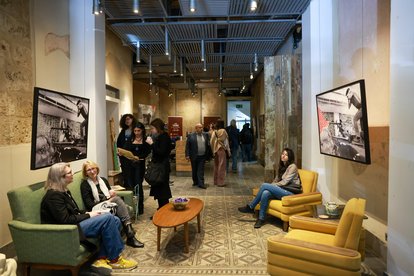
The Human Library also brought together diverse voices like tour guide and researcher Samira Ezzo, geographer and urbanist Hala Younes, feminist activist Myriam Sfeir, sound designer Cedric Kayem, poet and cultural mediator Antoine Boulad, as well as storytellers and archivists like Fida Bizri, whose childhood on the Green Line inspired the film Green Line, and Adeeb Farhat, whose work documents stories from South Lebanon.
Through these encounters, memory was no longer abstract or distant, it was intimate, embodied, and deeply human.
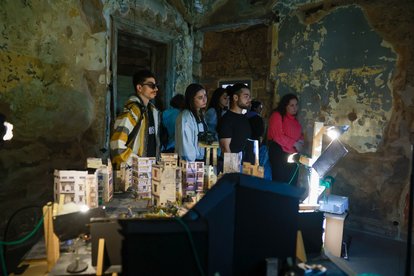
Confronting Silence: FNF Speech at the inauguration
Speaking at the opening on behalf of the Friedrich Naumann Foundation, FNF Lebanon project manager May El Masri underlined the Foundation’s commitment to creating spaces for dialogue and confronting difficult histories.
As she put it in her speech:
“Ultimately, the future of Lebanon cannot be built on silence. Nor can it be built on forgetting. It can only be built on recognition, justice, and a shared commitment to repair what was broken — together.”
The speech highlighted that confronting the past is not about reviving conflict but about acknowledging pain, recognizing responsibility, and moving beyond silence. It emphasized that Lebanon’s future cannot be built on forgetting, but rather on recognition, justice, and a shared commitment to repair what was broken together.
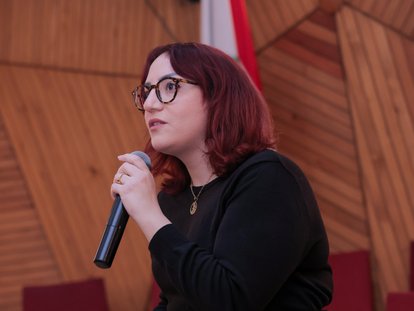
A Collective Conversation on the War's Legacy
As the day unfolded, the event’s central conversation, “How does the war live on in and between us?”, brought together diverse voices from political, social, and psychological backgrounds to reflect on how Lebanon continues to carry the legacy of its war years.
In a compelling exchange, Wissam Lahham, Dr. Nahla Harb, Adeeb Farhat, and Hassan Salha came together to explore how the war still shapes personal and collective realities. This dialogue asked hard questions: Is it still important to talk about the war? How does it persist, in memory, identity, and behavior, and what does it mean to carry this history forward?
The conversation deliberately avoided the rigidity of a formal panel, instead creating space for audience participation and personal reflection.
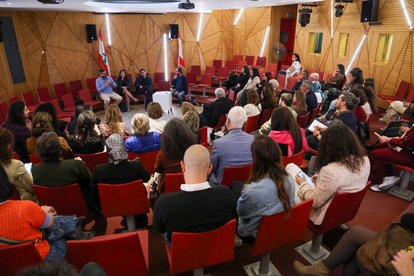
Memory in Motion: Art and Performance
In the evening, Beit Beirut transformed once again, this time through music, dance, and performance art. Live performances activated the building’s many layers, responding to memory through sound, movement, and word, and turning the space into a living archive of artistic expression.
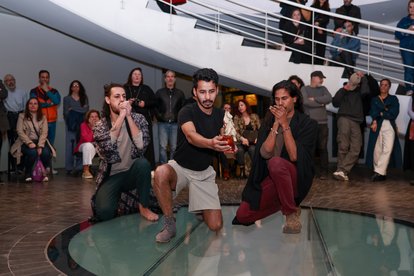
Ultimately, the inauguration of Hkeeli succeeded in transforming Beit Beirut into more than a site of memory, it became a site of encounter. Throughout the day, more than 1000 people visited the exhibition, turning the space into a vibrant meeting point for stories, reflections, and dialogue.
The event redefined what remembrance could mean for Lebanese society: not a static act of looking back, but a dynamic process of listening, feeling, and speaking together. It reminded everyone present that memory is not an individual burden but a shared civic responsibility, and that telling stories, even the painful ones, remains an act of courage, and connection.
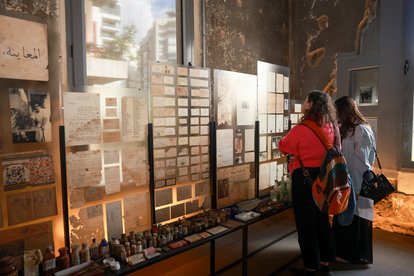
Memory Beyond the Day
The day may have ended, but Hkeeli made it clear that the conversation continues, not only within the walls of Beit Beirut, but within the hearts, homes, and streets of Lebanon itself.
And to keep this conversation alive, Beit Beirut will remain open to the public every week from Wednesday to Sunday, from 12:00 PM to 8:00 PM, inviting everyone to step inside, reflect, and add their voice to this collective journey of memory and dialogue.
